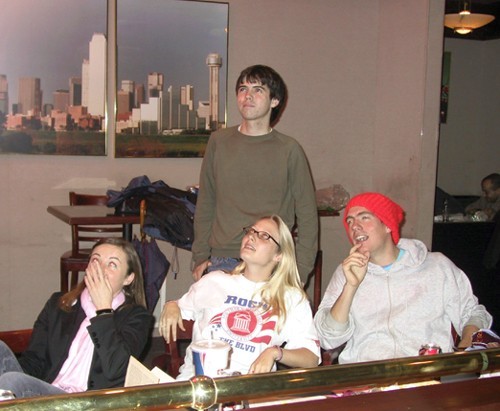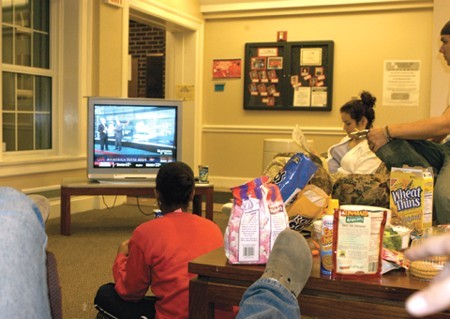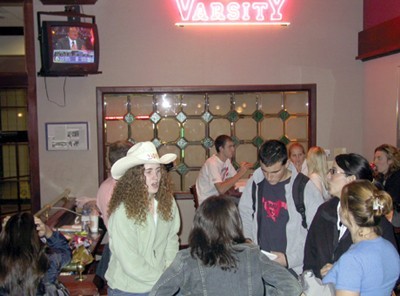
Students watch the returns come in on the Hilltop
As polling locations across Dallas closed their doors at 7 p.m.last night, television sets across campus flipped to a number ofstations carrying election coverage, and the students werewatching.
In the Hughes-Trigg Student Center Varsity, SMU’sPolitical Science Symposium held a results watching party, completewith food, drinks and a wide variety of political opinions.
Under the faculty guidance of political science professors JoeKobylka and Dennis Simon, the symposium has put forth numerousefforts this semester in order to raise campus awareness on thepresidential race.
The Political Science Symposium, according to programming chairLauren Leahy, “[is] a non-partisan group promoting politicalawareness among the SMU community.”
Through events such as “Rock the Boulevard” and theupcoming “Life After Political Science,” Leahy said thegroup hopes, “to foster interest and education onissues.”
According to sophomore theatre major Ryan Johnson, who viewedsome of the night’s events with other students on a largeprojection screen located in a Hughes-Trigg stairwell, felt theelection was well covered on campus.
“People should be watching the election,” he said,”because voting is a very important part of life.”
Leahy explained that all students, whether left wing, right wingor somewhere in between, are welcome to the symposium’sevents.
“We are not promoting one candidate or another,” shesaid. “We just want people to show up and care.”
The results party itself showed bi-partisanship by airing threedifferent media organizations’ coverage of the election– FOX, CNN and NBC.
“This is a good way to bring people together,” saidDesiree Brown, president of the Political Science Symposium.
Brown, a junior political science and math double major, hopesevents such as last night’s act as a magnet for students whodon’t have a strong political affiliation either way.
“We want to see people who wouldn’t necessarilywatch the election,” she explained.
Leahy agreed, citing a quest for knowledge as yet another reasonfor students to attend political events.
“We really want to see people who want to learn more, askquestions and get involved,” she explained.
“We did it for the 2000 election,” Leahy continued.”We really want tonight to be for people to engage inconversation, to better understand the election and the otherside.”
Though the atmosphere was one of learning, a key element wassubtracted at the last minute.
“Professors [Kobylka and Simon] were supposed to behere,” Brown said, “but they got invited toCongressional parties. They were going to mingle and talk withstudents about the election.”
As junior Eric Johnson viewed one of the televisions in theVarsity, he reflected on the social pertinence of the event.”You could have a pretty good get-together and watch theevent,” he said.
With so much media attention being given to “swingstates” such as Florida, Ohio and New Mexico, Brown explainedhow each vote can influence lives thousands of miles away.
“We want people to be more aware of what’s going onand how it affects the country,” she said.
“Even the senator race in Ohio will affect us,”Brown continued, “because it will change the makeup ofCongress, which governs everyone.”
As electoral votes were counted and battleground states wonover, members of the Political Science Symposium watched the eventsunfold in the Varsity, hoping to raise awareness of the politicalworld around us.

Students watch the returns come in on the Hilltop

Students watch the returns come in on the Hilltop








